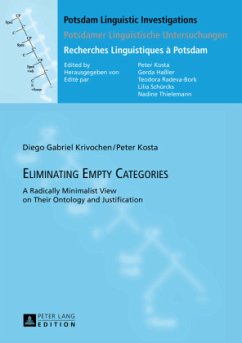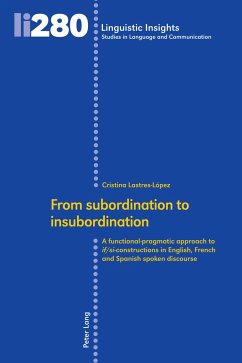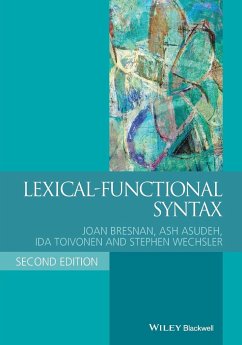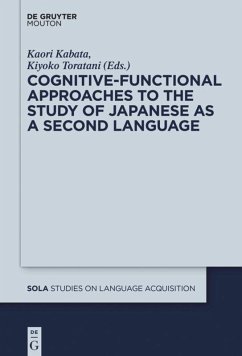
A Fine-Grained Approach to Lexical and Functional Syntactic Categories
Evidence from English prepositions and their acquisition
Versandkostenfrei!
Versandfertig in 6-10 Tagen
39,99 €
inkl. MwSt.

PAYBACK Punkte
20 °P sammeln!
Most syntactic theories have come to rely on thedistinction between lexical and functional categories: nouns and verbs are lexical , whiledeterminers and inflection are functional . Agrowing body of research challenges this binarydivision, suggesting there are semi-lexical elements with both lexical and functional properties. This book develops a fine-grainedapproach where lexical and functional are nottaken as ends of the same continuum, but are seen astwo separate and distinct features, creating atwo-dimensional binary distinction ([±Lexical,±Functional]). This analysis is applied to thedo...
Most syntactic theories have come to rely on the
distinction between lexical and functional
categories: nouns and verbs are lexical , while
determiners and inflection are functional . A
growing body of research challenges this binary
division, suggesting there are semi-lexical
elements with both lexical and functional
properties. This book develops a fine-grained
approach where lexical and functional are not
taken as ends of the same continuum, but are seen as
two separate and distinct features, creating a
two-dimensional binary distinction ([±Lexical,
±Functional]). This analysis is applied to the
domain of prepositions, and resolves most of the
contradictions manifest in that domain. Support is
drawn from parallels in syntactic and semantic
behavior, as well as evidence from a longitudinal
study of five children s early spontaneous
production. This monograph should be useful to
researchers in a variety of domains, including
syntax, aphasia, first- and second-language
acquisition. Anyone interested in the
nature of syntactic categories in general, and the
nature of prepositions and prepositional-elements in
particular, will find this book useful.
distinction between lexical and functional
categories: nouns and verbs are lexical , while
determiners and inflection are functional . A
growing body of research challenges this binary
division, suggesting there are semi-lexical
elements with both lexical and functional
properties. This book develops a fine-grained
approach where lexical and functional are not
taken as ends of the same continuum, but are seen as
two separate and distinct features, creating a
two-dimensional binary distinction ([±Lexical,
±Functional]). This analysis is applied to the
domain of prepositions, and resolves most of the
contradictions manifest in that domain. Support is
drawn from parallels in syntactic and semantic
behavior, as well as evidence from a longitudinal
study of five children s early spontaneous
production. This monograph should be useful to
researchers in a variety of domains, including
syntax, aphasia, first- and second-language
acquisition. Anyone interested in the
nature of syntactic categories in general, and the
nature of prepositions and prepositional-elements in
particular, will find this book useful.












